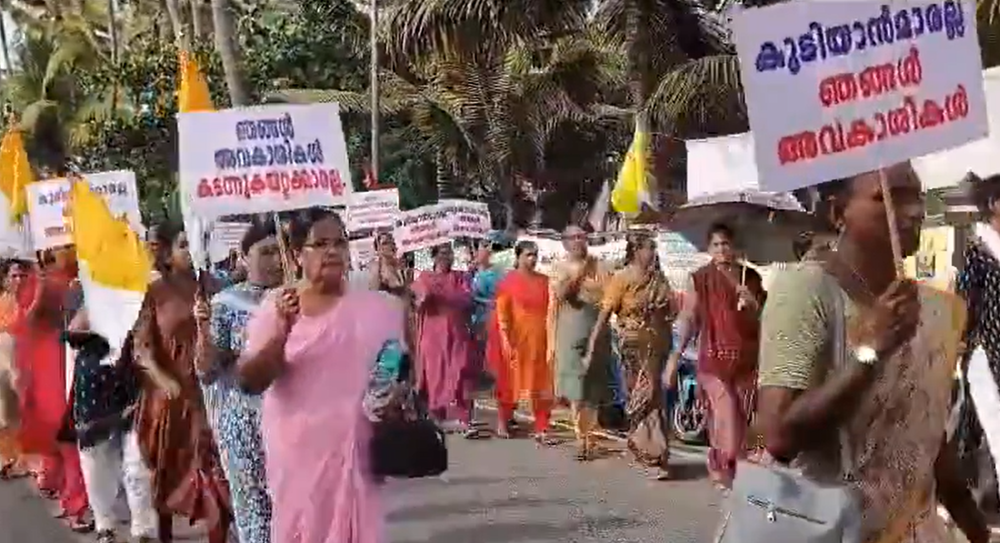Munamban a question of justice, not a clash with Muslims say Bishops
The Bishops' Conference intervenes in the dispute that in Kerala sees the Waqf (the Islamic Property Administration) claiming land where Christian families have lived for decades. The bishops also denounce the spreading of ‘fragmented’ news about a meeting between the president of the CBCI, Msgr Thazhath, and about twenty national parliamentarians, with the risk of ‘creating confusion’.
Delhi (AsiaNews) - The Catholic Bishops' Conference of India (CBCI) has reaffirmed in a note its commitment to justice in the ongoing dispute in Kerala with some Muslim groups over the ownership of some land on which numerous Christian fishing families have lived for decades in Munambam.
At the same time, however, the communiqué also expresses ‘deep disappointment’ at some ‘partial reconstructions’ of an informal meeting between the president of the CBCI, the Syro-Malabar archbishop Andrews Thazhath, and some 20 Christian national parliamentarians on 3 December in Delhi.
The Kerala affair is related to a claim by the Waqf Board (the body that administers the properties of the Muslim community) on 404 acres of land in the Munambam coast in Ernakulam district, inhabited for generations by about 600 Christian and Hindu families.
The dispute began in 2019 when the Waqf claimed ownership claiming that those lands in 1950 were donated by a Muslim benefactor to Farook College in Kozhikode. The institution allegedly then gave them to the families, but the Waqf claims it had no title to do so.
Complicating matters is the fact that India's law on the property of Islamic communities dates back to 1954, thus post-dating the events. What is more, the issue is very sensitive today, since Hindu nationalists are pushing to reform this law by including non-Muslim members in the councils, a step that many see as a further hostile action against minorities.
According to newspaper reports, in the very meeting with the president of the Bishops' Conference, some opposition MPs insisted that the Church should expressly side with Muslims in their battle to defend the prerogatives of the Waqf, also complaining about support that was allegedly offered to the BJP in some Kerala seats. In the meantime, however, the Munambam issue remains unresolved, with Muslim voices insisting on claiming ownership of the land and the Kerala High Court postponing its consideration of the matter until January.
In the note, the Cbci says it stands ‘firmly with the people of Munambam who have lived and farmed this land for generations’. ‘Our position on this issue,’ the bishops explain, ‘is not based on religious identity, but on a crucial concern for human rights. It must be absolutely emphasised that this is not a question of relations between Christians and Muslims, but of justice and the rights enshrined in our Constitution.
It is our firm conviction that any action that undermines the constitutional rights of individuals, regardless of their religion, is unjust and must be opposed’. This is why the bishops call for ‘a peaceful and fair solution to the dispute, guided by constitutional principles and mutual respect’.
As for the meeting with the MPs, an anonymous source revealed to the Press Trust of India agency that the agenda of the meeting included the role of Christian MPs in supporting and protecting the community and its rights, the increase in attacks and threats against minorities, and the misuse of the FCRA (the authorisation required to receive funds from abroad, ed.) to target Christian institutions.
During the meeting, there were also calls for church leaders to highlight ‘the important role played by communities today’ and ‘not to be merely reactive to negative news’. While one MP reportedly criticised photo-opportunities with politicians, calling instead for ‘calling out those who do not protect the Constitution’.
‘Those who reported these contents,‘ the Bishops’ Conference replied, ‘violated the agreement between the MPs and the religious leaders present at the meeting, according to which there should have been no press releases or photographs due to the informal nature of the meeting. The selective dissemination of details created confusion and distorted the representation of the nature of the discussions that took place'.







.png)










